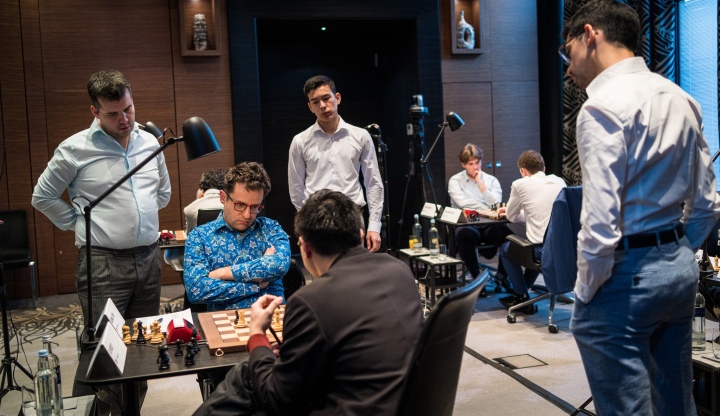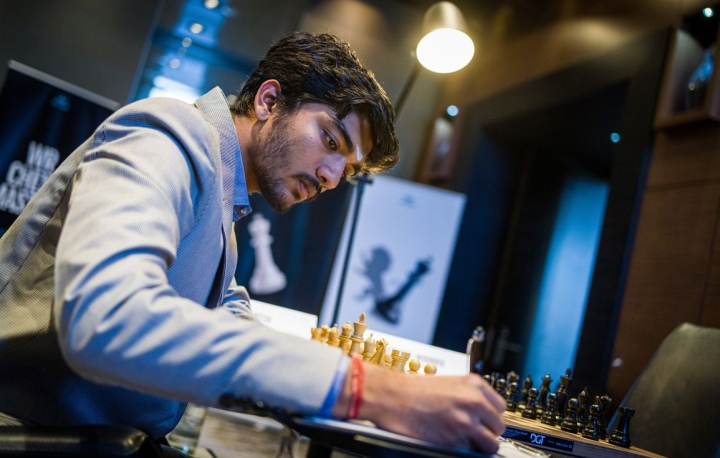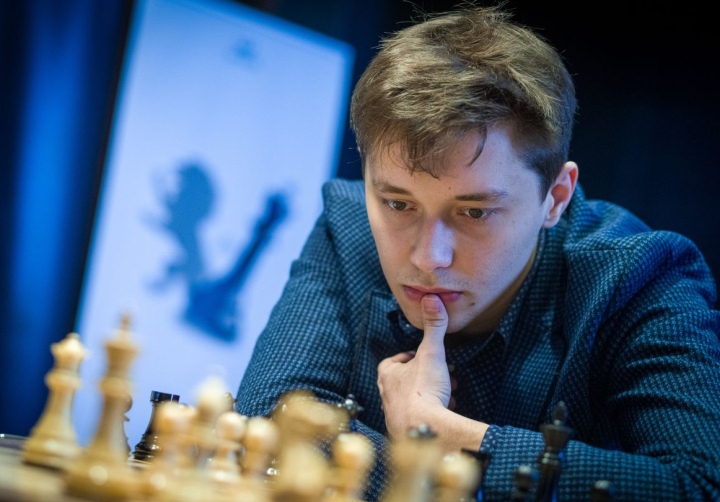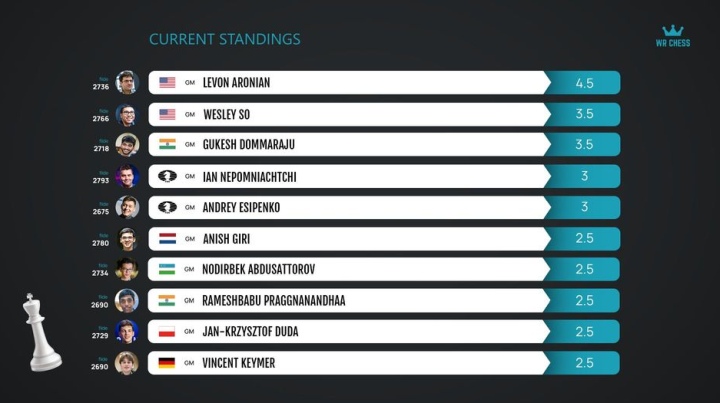First against second: It could have been the game that made the tournament’s outcome completely uncertain again. Wesley So, one point behind, had to do nothing more than defeat Levon Aronian with the white pieces. Then both would have been back on level ground, and the field would have been close together. But the game ended in a draw – like the other four games of the sixth round, some of them after endgame battles lasting more than six hours. The standings are unchanged after this day of draws.
 Wesley So played a fighting game but didn’t come close to catching Levon Aronian. | Photo: Lennart Ootes
Wesley So played a fighting game but didn’t come close to catching Levon Aronian. | Photo: Lennart Ootes
Aronian was even close to almost deciding the tournament early. However, it would have required a computer-like solution, which So and Aronian missed. Instead of the computer maneuver, Levon played a very human one: transfer the knight from the edge back into the game. On the move after that, Aronian missed a very similar opportunity. After that, So did not again let the dynamic equilibrium of the sharp position out of his hands. In the end, Aronian forced a draw by perpetual check.
Still in a comfortable situation with “plus three,” Aronian was not overly disappointed after the game. “I played a fighting game, and when you fight, you get chances,” Aronian explained in the interview. “But it’s also hard to avoid missing chances in the course of a tournament. The opponents are strong, it happens.”
After the draw against So, Levon Aronian continues to lead the field with a one-point advantage, followed by Wesley So and Gukesh with 3.5 points each. The young Indian failed to capitalize on the opportunity to catch up half a point to the leaders in his white game.
 Gukesh and Nodirbek Abdusattorov played until the board was almost cleared. | Photo: Lennart Oootes
Gukesh and Nodirbek Abdusattorov played until the board was almost cleared. | Photo: Lennart Oootes
After an English opening, Gukesh and Nodirbek Abdusattorov soon ended up in an even endgame in which the two white bishops were not superior to the two black knights. Which of the two played the balanced position to win? Probably not only the commentators Yasser Seirawan and Elisabeth Pähtz were wondering. One thing is certain: they played until the board was almost cleared, and the draw was inevitable.
Ian Nepomniachtchi would have drawn level with the two runners-up with a win. After his series of draws, he now wanted to achieve this victory against Andrey Esipenko, not only on the board but also by psychological means. When Esipenko, after more than six hours and almost 80 moves, had worked out how to sacrifice his knight but eliminate all the white pawns in return and force a draw, Nepo suddenly had an intense facial expression.
“He pulled a face like he pulls when his opponent has made a mistake,” Andrey Esipenko reported afterwards. And he told about his fear in the face of Nepomniachtchi’s grimaces, he had made a mistake. Esipenko: “I aged ten years in this game.”
 Andrey Esipenko (before ageing ten years). | Photo: Lennart Ootes
Andrey Esipenko (before ageing ten years). | Photo: Lennart Ootes
Jan-Krzysztof Duda and Vincent Keymer played an Anti-Marshall, in which Keymer initially got good play after an original exchange sacrifice. Later he gave back the exchange, perhaps prematurely. The result was a stable but slightly inferior position for Black, where the Pole could play for a long time for two results. Duda tried his best for a good six hours, but Keymer held his ground.
Praggnanandhaa was pressing from the opening against Anish Giri. He kept up the pressure deep into the endgame, where only the Indian was playing for a win despite being down an exchange thanks to his central passed pawn duo. Giri finally managed to take both passed pawns off the board by sacrificing the exchange back. The game ended in a bloodless queenside endgame with nothing to gain for either side.
After the second time control, some observers were confused when they noticed that chief arbiter Gregor Johann had stopped the clock. Is it over? No, it was not. The players did not write down their moves in time trouble. While Giri and Pragg updated their sheets, Johann paused the clock according to FIDE rule 8.5.1.
 Elo 2800 when it comes to chess rules: Chief Arbiter Gregor Johann. | Photo: Lennart Ootes
Elo 2800 when it comes to chess rules: Chief Arbiter Gregor Johann. | Photo: Lennart Ootes
More photos and interviews in the tournament feed

Text: Official website
Photo: Lennart Ootes
Offical website: wr-chess.com/







